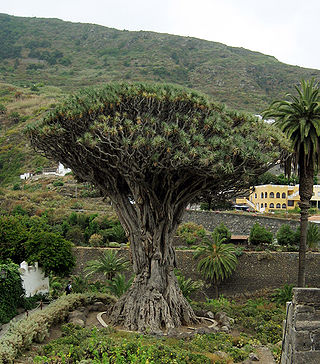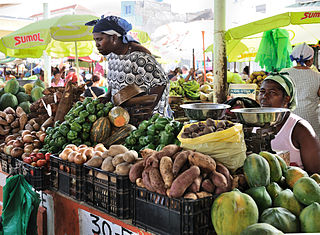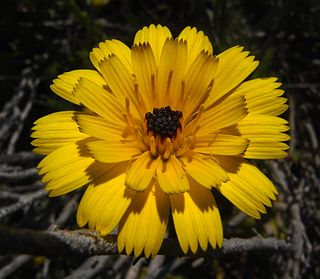
Cape Verde is a group of arid Atlantic islands which are home to distinct communities of plants, birds, and reptiles. The islands constitute the unique Cape Verde Islands dry forests ecoregion, according to the World Wildlife Fund.

Madeira, officially the Autonomous Region of Madeira, is one of two autonomous regions of Portugal, the other being the Azores. It is an archipelago situated in the North Atlantic Ocean, in a region known as Macaronesia, just under 400 kilometres (250 mi) to the north of the Canary Islands and 520 kilometres (320 mi) west of the Kingdom of Morocco. Madeira is geologically located on the African Tectonic Plate, although it is culturally, politically and ethnically associated with Europe, with its population predominantly descended from original Portuguese settlers. Its population was 251,060 in 2021. The capital of Madeira is Funchal, which is located on the main island's south coast.

Zino's petrel or the freira, is a species of small seabird in the gadfly petrel genus, endemic to the island of Madeira. This long-winged petrel has a grey back and wings, with a dark "W" marking across the wings, and a grey upper tail. The undersides of the wings are blackish apart from a triangle of white at the front edge near the body, and the belly is white with grey flanks. It is very similar in appearance to the slightly larger Fea's petrel, and separating these two Macaronesian species at sea is very challenging. It was formerly considered to be a subspecies of the soft-plumaged petrel, P. mollis, but they are not closely related, and Zino's was raised to the status of a species because of differences in morphology, calls, breeding behaviour and mitochondrial DNA. It is one of Europe's most endangered seabirds, with breeding areas restricted to a few ledges high in the central mountains of Madeira.

José Maria Pereira Neves is a Cape Verdean politician who is currently the president of Cape Verde, having previously served as the Prime Minister of Cape Verde from 2001 to 2016. He is a member of the African Party for the Independence of Cape Verde (PAICV). In the 2021 presidential election, he was elected with 51.7% of votes, beating his nearest rival Carlos Veiga who got 42.4% of the total votes.

The Savage Islands or Selvagens Islands are a small Portuguese archipelago in the North Atlantic Ocean, 280 kilometres (175 mi) south of Madeira, and 165 kilometres (105 mi) north of the Canary Islands. The archipelago includes two major islands, Selvagem Grande and Selvagem Pequena, each surrounded by a cluster of islets and reefs, with the total area of 2.73 km2 (1.05 sq mi). The archipelago is administered as part of the Portuguese municipality of Funchal, belongs to the Madeiran civil parish of Sé, and is the southernmost point of Portugal.

Macaronesia is a collection of four volcanic archipelagos in the North Atlantic, off the coasts of Africa and Europe. Each archipelago is made up of a number of Atlantic oceanic islands, which are formed by seamounts on the ocean floor whose peaks have risen above the ocean's surface.

Dracaena draco, the Canary Islands dragon tree or drago, is a subtropical tree in the genus Dracaena, native to the Canary Islands, Cape Verde, Madeira, western Morocco, and possibly introduced into the Azores.

The Madeira firecrest, Madeira kinglet, or Madeiracrest is a very small passerine bird endemic to the island of Madeira. It is a member of the kinglet family. Before it was recognised as a separate species in 2003, it was classified as a subspecies of the common firecrest. It differs in appearance and vocalisations from its relative, and genetic analysis has confirmed it as a different species. The Madeiran bird has green upperparts, whitish underparts and two white wingbars, and a distinctive head pattern with a black eye stripe, short white supercilium, and a crest that is mainly orange in the male and yellow in the female.

Picconia is a genus of two species of flowering plants in the family Oleaceae, found in the laurel forests habitat of Macaronesia.

Christianity is the largest religion in Cape Verde, with Roman Catholics having the most adherents. Different sources give varying estimates on the relative sizes of various Christian denominations. More than 94% of the population of Cape Verde is Christian, with almost 85% being Roman Catholic. About 5% of the population is Protestant. The largest Protestant denomination is the Church of the Nazarene. Other groups include the Church of the Nazarene, the Assemblies of God, Seventh-day Adventist Church, the Universal Church of the Kingdom of God, independent Baptists and various other Pentecostal and evangelical groups.

The economy of Cape Verde is a service-oriented economy that is focused on commerce, trade, transport and public services. Cape Verde is a small archipelagic nation that lacks resources and has experienced severe droughts. Agriculture is made difficult by lack of rain and is restricted to only four islands for most of the year. Cape Verde's economy has been steadily growing since the late 1990s, and it is now officially considered a country of average development, being only the second African country to have achieved such transition, after Botswana in 1994. Cape Verde has significant cooperation with Portugal at every level of the economy, which has led it to link its currency first to the Portuguese escudo and, in 1999, to the euro.

Cape Verde or Cabo Verde, officially the Republic of Cabo Verde, is an archipelago and island country of West Africa in the central Atlantic Ocean, consisting of ten volcanic islands with a combined land area of about 4,033 square kilometres (1,557 sq mi). These islands lie between 600 and 850 kilometres west of Cap-Vert, the westernmost point of continental Africa. The Cape Verde islands form part of the Macaronesia ecoregion, along with the Azores, the Canary Islands, Madeira, and the Savage Isles.

Tolpis is a genus of flowering plants in the tribe Cichorieae within the family Asteraceae. It is native to Africa, Southern Europe, the Middle East and Macaronesia. Many species are limited to the Canary Islands.

Gaspar Frutuoso was a Portuguese priest, historian and humanist from the island of São Miguel, in the Portuguese archipelago of the Azores. His major contribution to Portuguese history was his detailed descriptions of the history and geography of the Azores, Madeira, Canary Islands and references to Cape Verde, which he published in his six-part tome Saudades da Terra, as well as Saudades do Céu. He is normally cited in settlement history of the islands of the Azores.

The Azores wood pigeon, Columba palumbus azorica is an endemic subspecies of the common wood pigeon, located in the Atlantic Azores islands of Portugal. This endemic subspecies is the only live pigeon present in the laurel forest habitat of the Azores Islands.

The Canary damsel, or Cape Verde gregory is a species of marine fish of the family Pomacentridae. It lives primary in shallow, subtropical waters of the eastern Atlantic Ocean.

Saudades da Terra is a manuscript, was published by father Gaspar Frutuoso,which forms a reference work on Macaronesia in the late 16th century.

The Macaronesian Biogeographic Region is a biogeographic region, as defined by the European Environment Agency, that covers the Azores, the Canary Islands, and Madeira. The name comes from the group of four archipelagos collectively known as Macaronesia that also include Cape Verde, which is not included in the European region.




















